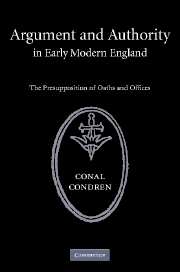Book contents
- Frontmatter
- Contents
- Preface
- Introduction
- Part I The liquid empire of office
- Part II The authority and insolence of office
- Part III ‘I, A. B.’
- 11 An overview of the oath in seventeenth-century argument
- 12 Coronation oaths
- 13 The oath of allegiance of 1606
- 14 Engagement with a free state
- 15 The oath of allegiance and the Revolution of 1688–9
- Epilogue
- Bibliography
- Index
13 - The oath of allegiance of 1606
from Part III - ‘I, A. B.’
Published online by Cambridge University Press: 28 October 2009
- Frontmatter
- Contents
- Preface
- Introduction
- Part I The liquid empire of office
- Part II The authority and insolence of office
- Part III ‘I, A. B.’
- 11 An overview of the oath in seventeenth-century argument
- 12 Coronation oaths
- 13 The oath of allegiance of 1606
- 14 Engagement with a free state
- 15 The oath of allegiance and the Revolution of 1688–9
- Epilogue
- Bibliography
- Index
Summary
O, come in, equivocator. Knock, knock, knock.
(Shakespeare, Macbeth 2.3)With its blood-red suns suspended low in the sky, chill November was Blotmonath in Anglo-Saxon, the month of blood; and so it was in 1605, with plans to blow the royal blood sky-high; but in searching the cellars under the House of Lords, Sir Thomas Knevet found powder kegs and a tall lurking fellow, with ‘three matches, and all other instruments fit for blowing vp the powder’. The discovery of the Gunpowder Plot was the new king's Armada. Its providential failure would enter the ritual calendar of English Protestantism, its celebration marking the light, the way and the ignis fatui of confusion and sedition. One match to the powder was the legacy of Elizabeth's harsh religious policies. A second was the reciprocated hostility of Rome and Spain to the heretic queen. Both were severe tests for indigenous Catholic loyalism. A third was the discrepancy between the hotter sorts of Protestants prominent in the Church of England and the diversity of lay belief, approaching independency at one extreme, remaining close to a native Catholicism at another. The via media of the Church of England was a hope for a road of uncertain width and smoothness and was little more settled than its new monarchical head. James's accession, however, was initially a cause of some Catholic optimism, ‘we have a Kinge [who] will restore us to our rightes’, wrote Katharine Gawen, and Henry Garnet anticipated ‘a golden time of unexpected freedom’.
- Type
- Chapter
- Information
- Argument and Authority in Early Modern EnglandThe Presupposition of Oaths and Offices, pp. 269 - 289Publisher: Cambridge University PressPrint publication year: 2006

